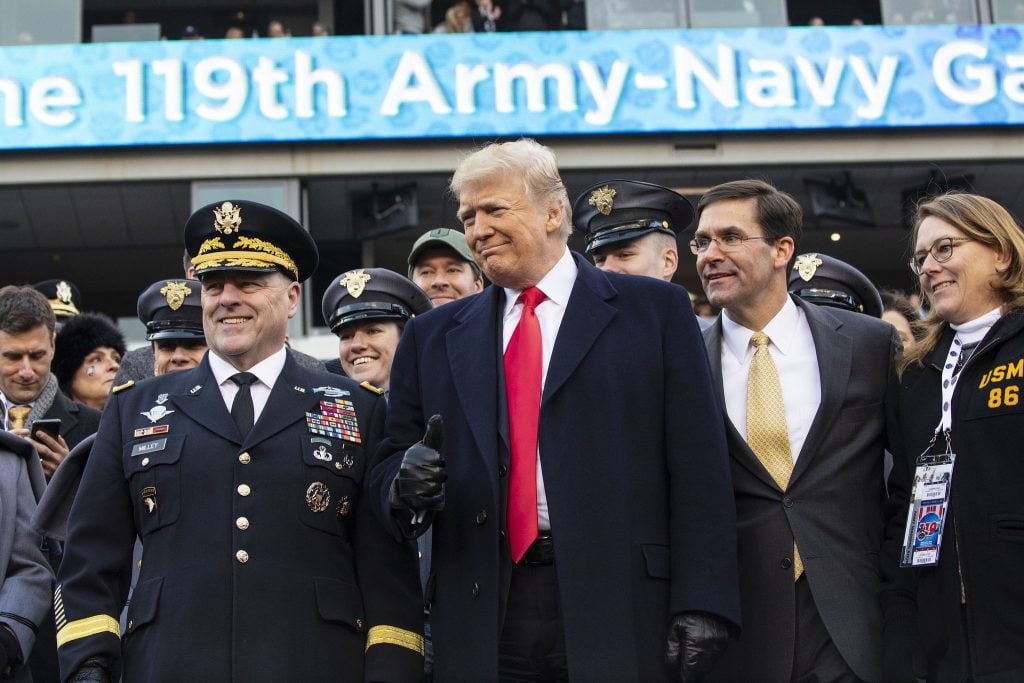Trump Threatens NDAA Veto If House Cuts Stand
Posted on

President Trump with nominee for Chairman of the Joint Chiefs, Gen. Mark Milley, and Acting SecDef Mark Esper.
WASHINGTON: The Trump Administration has issued a laundry list of objections to the House Armed Services Committee (HASC) version of the fiscal year 2020 National Defense Authorization Act — including a threat to veto the bill if the HASC-approved $733 billion top-line for DoD spending passes Congress.
Major objections in the “Statement of Administration Policy” provided to the House Rules Committee obtained by Breaking Defense, include:
- The $103 million cut to the Air Force’s Ground-Based Strategic Deterrent (GBSD) program. The White House argues that “the Air Force is on track to award a contract for the next phase of the GBSD program in FY 2020. This funding reduction would prevent the Air Force from awarding this contract and delay recapitalization of this leg of the nuclear triad.”
- The $376.4 million cut to the Next-Generation Overhead Persistent Infrared missile warning satellite program. The administration claims the cut would “delay the delivery by over three years and increase the costs by over $475 million.”
- The $413 million cut to the Missile Defense Agency and the $42 million re-scoping of the Flight Test Mission-44 (FTM-44) test of the Standard Missile-3. According the statement: “The Administration strongly objects to both actions, and specifically to the “$150 million reduction to the Improved Homeland Defense Interceptor Program (Redesigned Kill Vehicle).
 The reduction would be premature pending the result of DOD’s analysis of alternative courses of action for the Redesigned Kill Vehicle effort and could cause even further delays to the delivery of 20 additional Ground-Based Interceptors.” The White House further argues that the HASC shift in the FTM-44’s objective from a test against an ICBM to a test against an Intermediate-Range Ballistic Missile (IRBM) would violate a provision of the 2018 NDAA, as well as reducing the technical value of the test since the sea-launched missile was tested against a medium-range ballistic missile in 2018.
The reduction would be premature pending the result of DOD’s analysis of alternative courses of action for the Redesigned Kill Vehicle effort and could cause even further delays to the delivery of 20 additional Ground-Based Interceptors.” The White House further argues that the HASC shift in the FTM-44’s objective from a test against an ICBM to a test against an Intermediate-Range Ballistic Missile (IRBM) would violate a provision of the 2018 NDAA, as well as reducing the technical value of the test since the sea-launched missile was tested against a medium-range ballistic missile in 2018. - The $500 million cut, representing 50 percent of the budget, to the Air Force’s Next Generation Air Dominance effort to design as suite of air superiority capabilities including a replacement for the F-22 fighter. “Full funding for NGAD is essential to maintaining a strong United States industrial base capable of building the world’s most advanced aircraft,” the statement argues. “This 50 percent reduction in funding would result in a three-year slip in advanced aircraft development timelines and the cancellation of critical new production technology programs. Reduced funding would also risk setting the United States behind other nations applying rapidly evolving digital technology to future aircraft programs.”
- The barring of funds for a new low-yield nuclear weapon for the Navy’s Trident submarines. The White House “strongly objects to provisions that would reduce funding for the Trident II Modification Program and the W76-2 Modification Program, and block deployment of the system. As a measured response to a real-world escalatory threat, the W76-2 warhead reinforces the credibility of our deterrence posture and represents a key element of the 2018 NPR. … This would undermine deterrence and increases nuclear risk to the United States and our allies.”
In addition, while the White House welcomes the HASC creation of a Space Corps, it urges the House to reconsider and provide the Pentagon authority to begin transferring Air Force and other service personnel to the Space Corps in 2020. It also asks that HASC change add a senior civilian slot to lead the new armed force. The Senate bill did so, creating an Assistant Secretary of Defense for Space Policy.
The White House also argues against the changes, pushed by HASC Chairman Adam Smith, to the National Security Space Launch Program Phase 2 competition that would benefit SpaceX and Blue Origin in the mega-millions contest with United Launch Alliance and Northrop Grumman. Those provisions would in effect limit the Air Force’s planned Phase 2 contract for two providers to 29 launches between 2020 and 2024, and require the Air Force to open the competition again after that. The provision (in the bill’s Section 1601) further would provide up to $500 million to any company that wins a Phase 2 contract, but had not been given a contract under the previous Launch Services Agreement — that is, SpaceX as it is the only company in that position.
“The Administration strongly objects to this provision as it would increase mission risk for the Nation’s national security satellites,” the statement says. It expresses concern that the changes might affect the contract’s alignment “with the conclusion of the current generation of several satellite architectures.” The White House adds: “Confining Phase 2 to fewer missions would increase per-launch cost while simultaneously introducing risk and costs for some intelligence payloads.”
The House just this week took up the 2020 NDAA, and is working its way through more than 600 amendments — amid partisan bickering and a lack of support from House Republicans. Normally, an administration would issue a response to congressional action after both sides of Capitol Hill formally acted on the legislation. The Senate passed the NDAA on June 27, and met the administration’s request for $750 billion in top-line DoD funds.
Subscribe to our newsletter
Promotions, new products and sales. Directly to your inbox.
